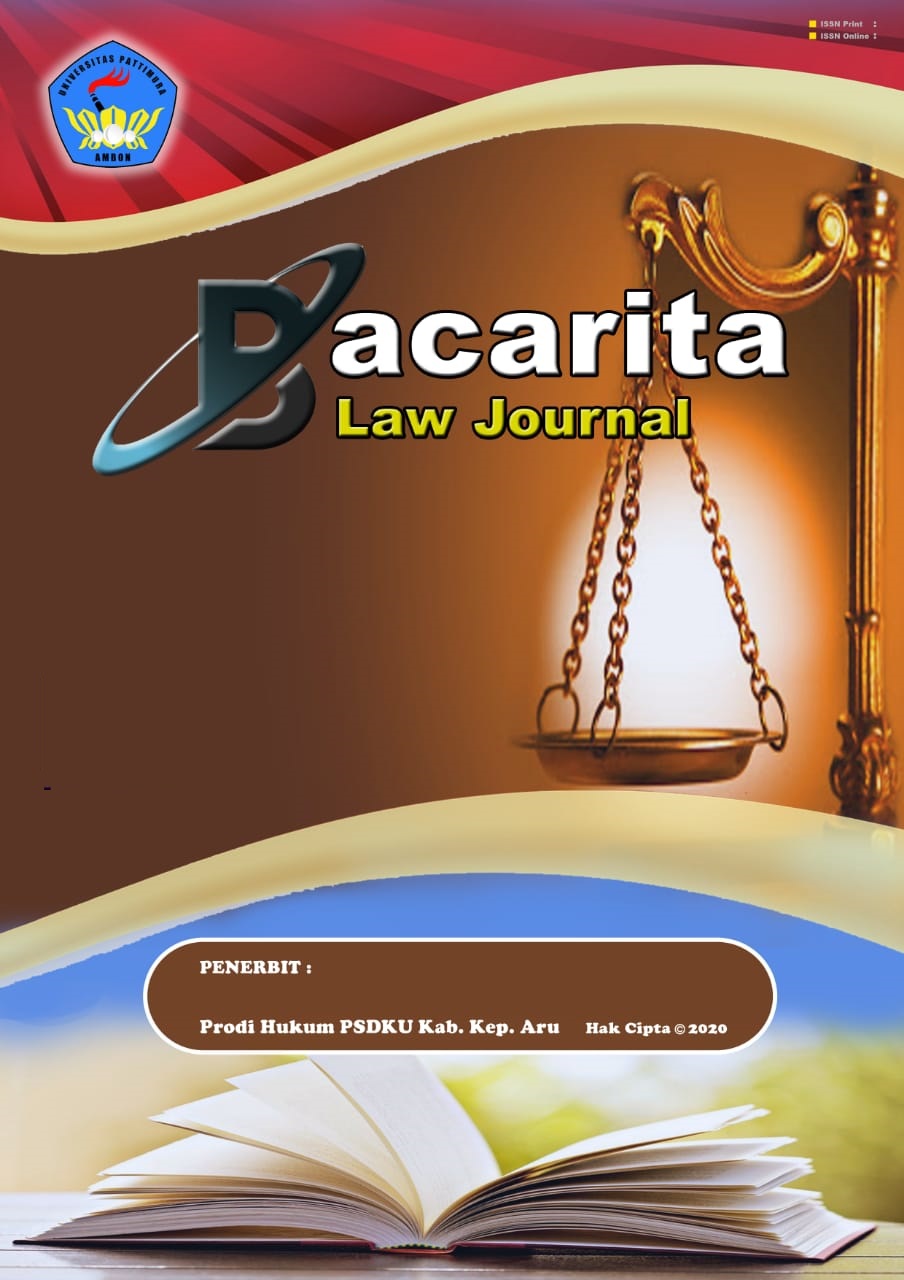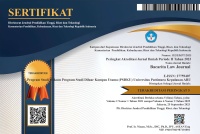Putusan Pengadilan Negeri Dobo Terhadap Tindak Pidana Pemilu
Abstract
In its development, general election crimes in Indonesia have experienced many changes, both in the form of increasing types of criminal acts and differences in the addition of criminal sanctions. This is because every day, election crimes are becoming a very serious concern because the measure of a democratic country's success is seen from its success in holding elections. The aim of this research is to examine and analyze the basic considerations of Dobo District Court judges in imposing fines on perpetrators of criminal acts, and the Dobo District Court Decision Number 60/Pid.Sus/2020/PN.Dob can have a deterrent effect on defendants who commit election crimes. This type of research is normative juridical in nature. The research type is descriptive-analytical. Sources of legal materials use primary legal materials and secondary legal materials. Techniques for collecting legal materials through literature study and qualitative analysis of legal materials. The research results show that the basis for the judge's consideration in imposing a fine in court decision Number 60/Pid.Sus/2020/PN Dob is because the judge considers both juridical and non-juridical considerations. Juridically, the defendant's actions could harm other people, while non-juridically, the defendant was cooperative and polite, thereby making the trial run smoothly and the defendant has never been punished. all of which cannot be separated from the indictments and demands filed by the public prosecutor with a single charge of election crimes. And in the decision of the Dobo District Court Number 60/Pid.Sus/2020/PN.Dob it does not have a deterrent effect on defendants who commit election crimes because fines can only be felt by poor people, but in essence these fines do not applies to the perpetrator in this case because the perpetrator of the election crime is the Chairman of the Aru Islands Regency DPRD who of course is economically capable of carrying out a fine, therefore the fine expected in this decision does not have a deterrent effect.
Downloads
References
Buku
Adami Chazawi, Pelajaran Hukum Pidana Bagian I, Jakarta, 2018.
Andi Hamzah, Sistem Pidana dan Pemidanaan Indonesia, Jakarta: Pradnya Paramita, 1993.
Balakrishnan, Reform of Criminal in India Some Aspects”, dalam Resource Material Series, No. 6, (Fuchu, Tokyo, Japan: UNAFEI, Oktober 1973.
Barda Nawawi Arief, Kapita Selekta Hukum Pidana, Bandung: Citra Aditya Bakti, Bandung, 2003.
Chairul Huda, 2006, “dari ‘Tiada Pidana Tanpa Kesalahan’ Menuju Kepada’ Tiada Pertanggungjawaban Pidana Tanpa Kesalahan’”, Jakarta: Prenadamedia Group, 2006.
Clinard & Yeager menulis, White Collar Crime Terdiri Dari Dua Bagian, Yaitu Accupational Crime Dan Corporate Crime (Lihat : Marshall B. Clinard and Peter C. Yeager, Corporate Crime , (New York : The Free Press, !980).
De Korte Vrijheidsstraf Als Vrijetijdsstarf (Pidana Badan Singkat Sebagai Pidana Di Waktu Luang) (Diterjemahkan oleh Tristam Pascal Moelyono), Bandung: Citra Aditya Bakti, 1991.
Henk Schulte Nordholt, (ed.) & Ireen Hoogenboom (ast.ed.), Indonesian in Transition, Yogyakarta: Pustaka Pelajar, 2006.
Jan Remmelink, Hukum Pidana (Komentar Atas Pasal-pasal Terpenting Dari Undang-Undang Hukum Pidana Belanda dan Padanannya dalam Kitab Undang-undang Hukum Pidana Indonesia), Jakarta: Gramedia Pustaka Utama, 2003.
J. M. van Bemmelen (Diolah oleh De Krantz), Hukum Pidana 2 : Hukum Penitensier, Bandung: Bina Cipta, 1986.
Joko Prakoso, Tindak Pidana Pemilu, Jakarta: Sinar Hatapan, 1987.
Mahi M, Hikmat, Komunikasi Politik (Teori dan Praktik Dalam Pilkada Langsung), Bandung: Simbiosa Rekatama Media, 2010.
Moeljatno, Asas-Asas Hukum Pidana, Jakarta: Rineka Cipta, 2015.
Muladi dan Barda Nawawi Arief, Teori-Teori Teori-teori Dan Kebijakan Pidana, Bandung: Alumni, 1992.
Muladi, Kapita Selekta Sistem Peradilan Pidana, Semarang: Badan Penerbit Universitas Diponegoro Semarang, 1995.
Paimin Napitupulu, Peran dan Pertanggungjawaban DPR Kajian di DPRD Provinsi DKI Jakarta, Bandung: Alumni, 2004.
P.A.F. Lamintang, Hukum Penintensier Indonesia, Jakarta: Sinar Grafika, 2012.
Peter Mahmud Marzuky, Penelitian Hukum, Jakarta: Kencana Pranada Media Group. 2011.
Roeslan Saleh, Stelsel Pidana Indonesia, Jakarta: Aksara Baru, 1987.
Roeslan Saleh, Dari Lembaran Kepustakaan Hukum Pidana, Jakarta: Sinar Grafika, 1988.
Sutherland &Cressey, The Control” Hukum Dalam Perkembangan (Diterjemahkan oleh Soedjono D.), Bandung, 1974.
Schaffmeister, De Korte Vrijheidsstraf als Vrijetijdsstraf (Pidana Badan Singkat sebagai Pidana di Waktu Luang) (Diterjemahkan oleh Tristam Pascal Moeljono), Bandung: Citra Aditya Bakti, 1991.
Teguh Prasetyo, Hukum Pidana, Jakarta: Rajagrafindo Persada, 2018.
Skripsi, Tesis, Distertasi, Online/World Wide Web dan Lain-Lain
Ahmad Rizaldy Efektivitas penanganan Tindak Pidana Pemilu Dalam Pelaksanaan Pemilu Legislatif Tahun 2014 di Kabupaten Gowa― Melalui http://www. Repository.unhas.ac.id.
M. Arief Koenang. Skripsi. “Keterpaduan Dalam Penanggulangan Tindak Pidana Pemilihan Umum pada Pemilihan Kepala Daerah Serentak di Tahun 2017 (Studi Kasus di Provinsi Lampung). Melalui http://www.digilib.unila.ac.id.ac.id.
Copyright (c) 2024 Pieter H Patiasina, Hadibah Zachra Wadjo, Johan Pieter Elia Rumangun

This work is licensed under a Creative Commons Attribution-NonCommercial 4.0 International License.
Authors who publish their manuscripts in this Journal agree to the following conditions:
- The copyright in each article belongs to the author, as well as the right to patent.
- Authors are able to enter into separate, additional contractual arrangements for the non-exclusive distribution of the journal's published version of the work (e.g., post it to an institutional repository or publish it in a book), with an acknowledgment of its initial publication in this journal.
- Authors are permitted and encouraged to post their work online (e.g., in institutional repositories or on their website) prior to and during the submission process, as it can lead to productive exchanges, as well as earlier and greater citation of published work.
- Authors have the right to self-archiving of the article (Author Self-Archiving Policy)















